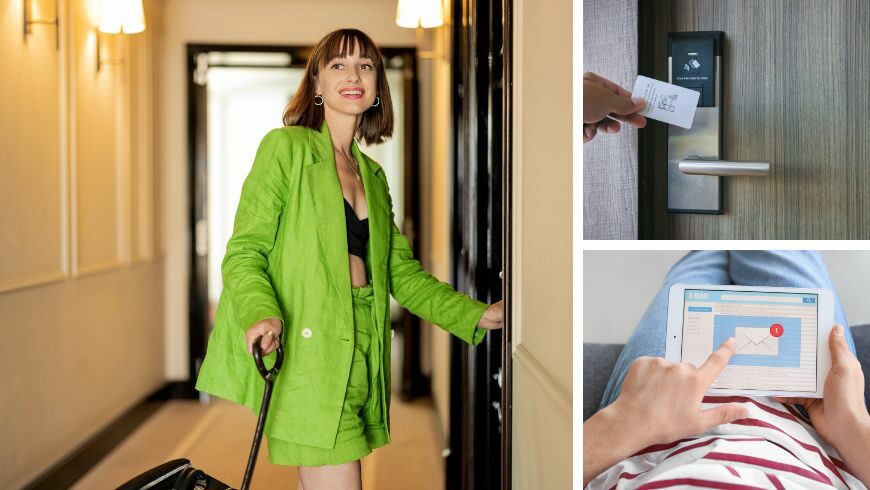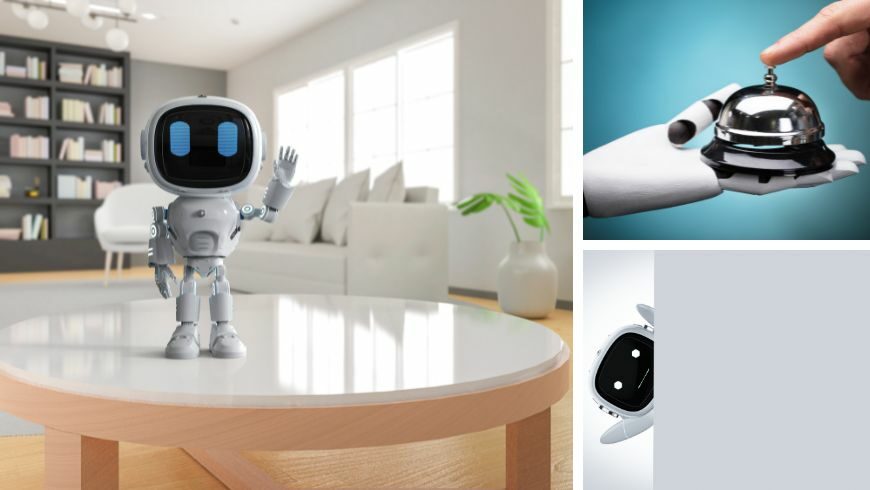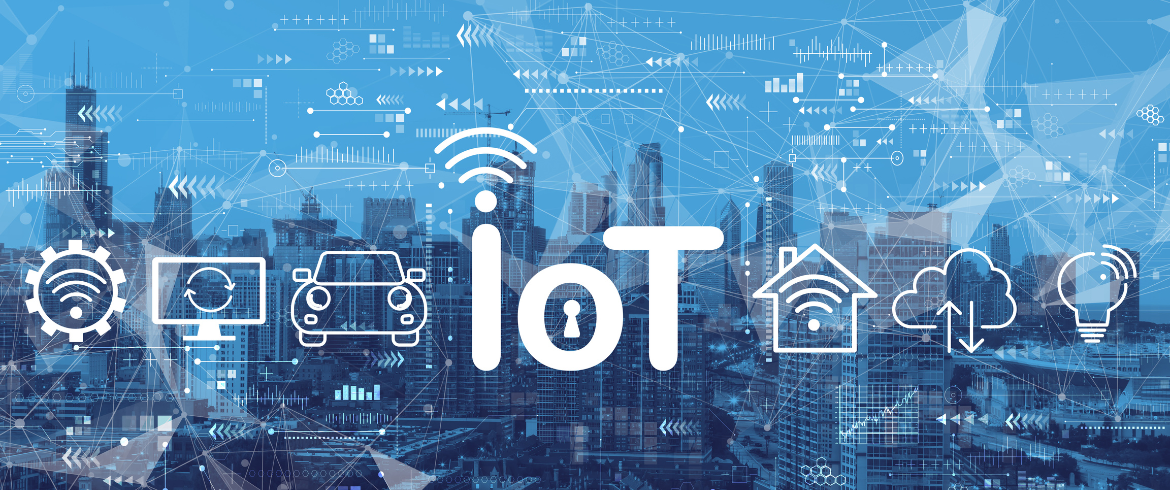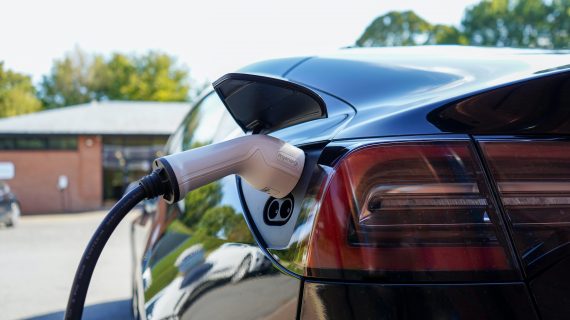The recent pandemic marked the rise of the Internet of Things in the travel sector, prompting industry players to adopt contactless, safer ways of attending to travelers, be it in hotels, at airports, or at tourist attractions. Since then, this technology has been supporting travel and hospitality businesses in winning loyal audiences and standing out. In this article, we’ll explain what kinds of IoT solutions in travel & hospitality industry are gaining momentum in today’s market and what their perks are.
How IoT in travel industry functions
In a nutshell, the technology refers to a system of interlinked devices which acquire data from individuals and the environment and then transmit it to a hub and exchange it with each other. The following constituent parts are involved here:
- the sensor-equipped gadgets themselves,
- the cloud-based software,
- the user interfaces, e.g. mobile apps, control panels, or self-service kiosks,
- the actuators, i.e. technology-equipped objects like bulbs, locks, kettles, curtains, thermostats, and so on.
Whenever changes occur in a certain condition or process, this information is passed to the actuators via Wi-Fi, RFID, Bluetooth, or by using other communication methods, and they respond automatically, or else users can choose their preferred settings manually via the user interfaces.
Turning to a dependable provider of IoT development services boasts the following perks:
- Streamlining and automating mundane tasks like hotel check-ins, luggage tracking, and scheduling room cleaning;
- Customizing offerings, such as adjusting temperature and illumination with voice commands;
- Minimizing resource waste with IoT-fueled trash cans, thermostats, water systems, etc., that react to motion and regulate their functioning accordingly;
- Signalizing the need for equipment and system maintenance and repair in a timely manner and thus, eliminating critical breakdowns and trimming expenses;
- Upgrading security of museums, art galleries, cafes, and other tourism facilities and areas with connected surveillance and keyless entry mechanisms, gas leak and smoke detectors, etc.

Popular IoT solutions in travel & hospitality industry
Below, we’ll describe some of the in-demand IT solutions that can help companies achieve the above benefits.
Digital twins
Through the implementation of this technology, vast airports, expansive hotel complexes, and various cultural attractions model the set-up and functioning of their convoluted infrastructure in a digital replica. This substantially facilitates its monitoring and maintenance. For example, you can simulate scenarios of the facility operation under varying conditions and leverage these insights in predictive management and decision-making. These products also help you establish better control over your HVAC and lighting systems, parking areas, staff allocation, and other aspects of your facility operation, leading to energy savings.
Dedicated property management software
This is mainly adopted by hotels. At the heart of its operation lies room availability monitoring in real time through trackers and keyless entry mechanisms, on one side, and a software platform, on the other side. By promptly receiving this information, the staff can make better decisions on the best time for check-ins, checkouts, and room cleaning and maintenance.
A prominent example of such a system is the Hilton Honors all-in-one app that performs various functions, from seamlessly unlocking your hotel room to helping you check out.
24/7 contactless room access
This feature is enabled through embedded in-lock systems controlled with the help of mobile apps, RFID, and Bluetooth. An illustrative example of this tech is SmartLockers by Goki. They ensure utmost security and ultimate convenience for guests while reducing property expenses on the employment of additional reception staff.
Room control via app, control panel, or voice commands
More and more people are implementing smart home technology. According to Statista, the number of such households worldwide has surpassed 422 million this year, in contrast with a modest 191 million households only five years ago. No wonder that, to keep up with the level of convenience expected by their tech-savvy guests, reputable chains like Marriott and Hilton now have room appliances seamlessly controlled by voice and through apps. The Wynn Las Vegas hotel went one step forward and integrated the Echo speakers powered by Alexa into their rooms, turning this move into their disruptive competitive advantage. The widespread citizenM chain introduced smart temperature, TV, and lighting adjustments in rooms through their custom-built app or MoodPad panels.
Robot assistants
Robotic helpers perform various minor activities like delivering newspapers, clean towels, and meals, storing luggage, cleaning, etc. Such uniquely designed IoT solutions in the travel & hospitality industry were integrated into the routines of the global YOTEL chain, enhancing guest experience.
Smart trackers in the aviation industry
These are used across the vast premises of Schiphol, Changi Airport, and Dubai International Airport to effectively monitor passenger and luggage flows and crucial metrics like engine performance, vibration intensity, fuel usage, and so on, all this in real time. Tile, SmartTag, AirTag, and LugLoc are popular luggage-tracking solutions. At Hong Kong International Airport and Munich Airport, sensor-powered technology enables contactless checkouts.
Trackers also help airports enhance safety. They collect and store impressive amounts of data from miscellaneous sources, e.g. flight data, maintenance information, weather conditions, replacement parts inventory, and so on, and make suggestions on when it is best to replace parts and conduct maintenance. Skywise, a versatile cloud-based platform built by Airbus, is an illustration of the IoT in travel industry that performs these functions.

To sum up
The report by Research and Markets states that in three years, enterprises will allocate an impressive $28 billion yearly on IoT in travel and hospitality, which is a substantial increase compared to the pre-pandemic $10 billion.
It’s true that the implementation of these solutions necessitates overcoming challenges and dealing with certain risks like guaranteeing data confidentiality and enabling interoperability with in-house systems. For instance, hotels installing voice-activated assistants must take care of clearing the command log between guests. Nevertheless, IoT helps businesses offer seamless, unforgettable experiences to travelers while ensuring faster, more accurate, and eco-friendlier operations with minimized resource usage.



